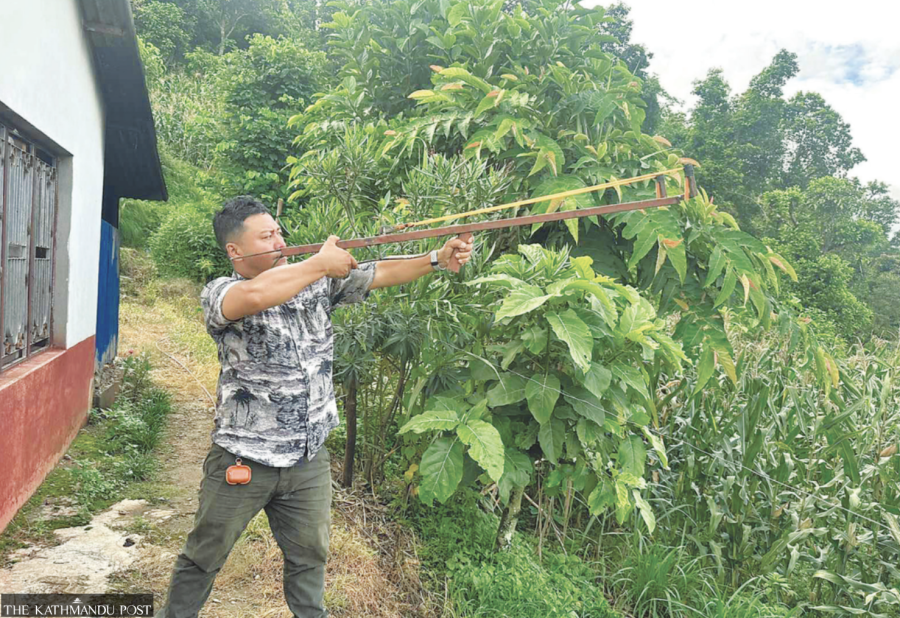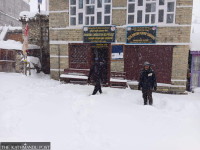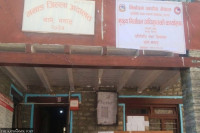Gandaki Province
‘Modern slingshot’ to tackle monkey menace
Compared to an ordinary slingshot, this one hurls stones three times farther, local government official says.
Hariram Uprety
Sudeep Khanal of Taklung in Sahid Lakhan Rural Municipality-4 in Gorkha sowed maize in his five ropanies of land last year. He and his family guarded his cornfield from dawn to dusk to protect it from monkeys. But he could not harvest even a few kilograms of maize.
“I stay in the corn field from early in the morning to evening to ward off monkeys since mid-May,” Khanal said. “The herd of monkeys enters the field and destroys the shoots soon after they grow. They eat up the cogs and damage the plants later. The family will remain hungry if we do not guard the cornfield from the monkeys.”
Menace of rhesus monkeys is on the rise in the rural areas lately. The farmers have a tough time protecting their crops, vegetables and fruits from the monkeys.
According to the local farmers of Taklung, the monkey terror increased significantly in the area over the past seven years. Gorkha’s Chalise, Bajhogara, Bhumethan and Pulamigaun villages are hardest hit by the monkey menace.
“The farmers have no alternative to stay in the cornfield and guard the field from all four sides,” said Dev Prasad Tiwari of Bajhogara in Sahid Lakhan-4. “We stay on four different sides and coordinate over cell phones to chase away the monkeys. It is not easy to chase away monkeys. They may attack children, women and even men if they are alone in the area.”
Due to unchecked terror by the rhesus monkeys, many farmers have been discouraged from growing crops. “A good number of farmers have left their land fallow,” said Yam Bahadur Thapa, chairman of Sahid Lakhan-4. “The ward office provided training to the local farmers to find alternatives to growing food crops. They were trained to grow grass, chilies, ginger and rear animals. But the training was not very successful.”
According to Thapa, the ward office had to seek another alternative as the local farmers were reluctant to give up growing food crops. “The ward office came up with an idea of making ‘modern slingshots’ to chase away monkeys,” he said. “We are hopeful that the new technology will be helpful.”
The ward office has constructed 50 modern slingshots in the first phase. “A modern slingshot is made with four feet of iron, spring, trigger, lock and rubber,” said Thapa. “Just like putting a stone in a slingshot, it throws the stone after aiming at the target and pressing the trigger.”
He added that compared to the ordinary slingshot, the modern slingshot throws stones three times farther.

Ward Chairman Thapa said that he learned to make modern slingshot videos from YouTube. “I am also a former Maoist combatant,” Thapa shared. “Making modern slingshots is my idea. My friends who have returned from foreign jobs have also helped to make it.”
A plan has been made to distribute 50 modern slingshots made by the ward office in the first phase to the monkey-affected areas of the ward area. He said that out of 675 households in the ward, more than 300 households have been affected by monkeys. “The monkeys have crossed the limits,” he said, “Not only the grain of the field, they throw away the food that is being cooked inside the house.”
The modern slingshot was built with the money left over from the income generation fund of the ward and with the help of the locals who are abroad. The ward office has fixed Rs1,800 for a slingshot for the people of other wards of the local unit. However, the ward office decided to provide a 70 percent subsidy to the farmers of the same ward.
The locals have suffered due to monkey terror not only in Taklung, but also in other villages of the district. The local unit has prioritised monkey control in its policies and programmes of the current financial year after there was a risk of arable land becoming barren due to monkey terror. Palungtar Municipality planted 6,000 saplings in the city area on Saturday for the implementation of the 'Monkeys of Forest to Forest Programme’. Collective tree planting has been conducted in all 10 wards of the municipality in coordination with the local forest users’ groups and other local organisations.
The Chief Administrative Officer of Palungtar Municipality Gautam Bhandari said that plants such as Banana, Mango, Jackfruit, Banyan, Peepal, Shami, Mulberry, Papaya, Guava, Litchi , Pineapple, Lapsi, etc., which are available around the house, were planted in the empty spaces of the community forest and on the banks of the river.




 22.6°C Kathmandu
22.6°C Kathmandu











